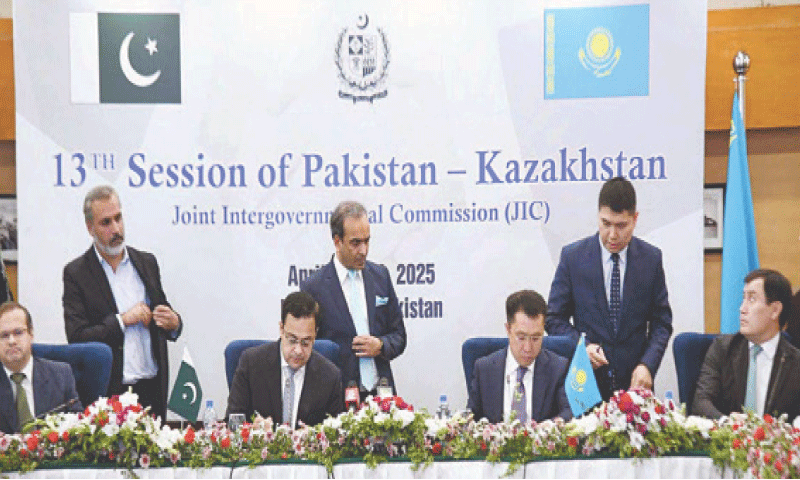ISLAMABAD: Pakistan and Kazakhstan on Tuesday agreed to sign a transit trade accord for movement of goods through three Pakistani ports – Karachi, Bin Qasim and Gwadar – and to engage other regional landlocked nations for opening multiple trade corridors.
At the conclusion of a two-day Joint Intergovernmental Commission (IGC), the two countries signed seven memorandums of understanding (MOUs) for cooperation in the transport, trade, business, culture and education sectors.
The 13th session of the Pakistan-Kazakhstan IGC on trade, economic, scientific, technical and cultural cooperation was co-chaired by Ahad Cheema, Federal Minister for Economic Affairs, and Kazakhstan’s Transport Minister Marat Karabayev.
The two sides reviewed the progress made since the last meeting and agreed on a number of new initiatives to further strengthen bilateral cooperation.
The agreement will allow the Kazakhs to use Karachi, Bin Qasim and Gwadar ports
A statement issued at the end of the IGC said the two sides agreed to accelerate finalisation of the Transit Trade Agreement and begin implementation of the ‘Roadmap for Trade and Economic Cooperation’. The two sides also signed a memorandum of understanding on electronic trade.
Connectivity and transport were key areas of IGC’s focus. Both sides reaffirmed the importance of regional trade corridors, particularly the Kazakhstan-Turkmenistan-Afghanistan-Pakistan and Kazakhstan-Uzbekistan-Afghanistan-Pakistan routes. “It was agreed to promote their use under the International Motor Transport Agreement”.
The successful launch of a multimodal trade corridor from Jebel Ali (UAE) to Almaty, Kazakhstan, via Pakistan, was acknowledged as a milestone in regional integration.
The parties agreed to expand cooperation between logistics companies and develop joint ventures to facilitate cross-border movement of goods through ports in Karachi, Qasim, and Gwadar.
In the agriculture sector, the two countries agreed to hold the first meeting of the Joint Working Group and share investment opportunities. Cooperation in plant protection and quarantine standards will also be enhanced.
In the financial sector, progress was made towards signing an MoU between the State Bank of Pakistan and the Kazakhstan Agency for Regulation and Development. Pakistan offered capacity-building support to Kazakhstan through training programmes for central and commercial banking professionals.
Tourism and cultural exchange
Emphasising the need for tourism and cultural exchange, both sides agreed to promote tourism by sharing lists of certified tour operators and launching joint promotional activities.
The Kazakh side expressed interest in opening branches of the Chess Academy and the Qazaq Batyry Mixed Martial Arts Academy in Islamabad.
The parties also appreciated the signing of cultural cooperation agreements and agreed to name streets in Islamabad and Astana after Abai Qunanbaiuly and Muhammad Ali Jinnah, respectively.
In the field of education, the two sides agreed to establish a joint working group to strengthen academic collaboration and facilitate exchange programmes for students and faculty.
Discussions included the possibility of setting up a science and technology centre named after K. Satbayev at NUST, Islamabad. Progress was made on several agreements aimed at enhancing cooperation in higher education, technical training, and research, the statement said.
Both sides agreed to strengthen cooperation in the field of information technology. MoUs were signed between NADRA and Kazakhstan’s National Information Technologies agency, as well as between Astana Hub and Ignite, laying the foundation for joint work in digital innovation and governance.
Published in Dawn, April 30th, 2025


